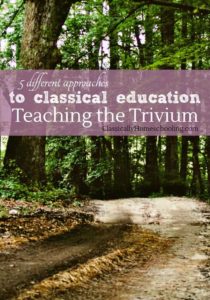Five Different Approaches: Teaching the Trivium
This post may contain affiliate links. For more information, please read my disclosure policy.
Teaching the Trivium
Teaching the Trivium: Christian Homeschooling in a Classical Style by Harvey and Laurie Bluedorn is yet another approach to classical education. Harvey and Laurie Bluedorn focus on the Biblical aspects of the Classical Christian Homeschool.
One difference I found remarkable in Teaching the Trivium: Christian Homeschooling in a Classical Style was the emphasis on Greek instead of Latin. If you only have time to study one classic language, the Bluedorns recommend Greek.
If you have time for two classic languages, they recommend you begin with Latin and add Greek later. This is in stark contrast with other classic curricula which barely mention Greek, much less recommend it over Latin!
Hebrew is also a recommended study if you have time for three languages.
Early Knowledge (Grammar) Stage: Before age 10
The Bluedorns suggest giving kids a gentle early education instead of jumping straight into a full course load.
Instead, you concentrate on teaching the children to read and write. Develop your child’s character and discipline. Lay a gentle, but strong, foundation for future studies. Encourage work and service along with daily family worship.
Children in this stage listen to books read aloud, memorize facts, and give oral narrations on what they’ve learned. Arts and crafts are encouraged. Field trips are taken to explore the local community.
Ensure there is plenty of time for children to play and explore during these early, enthusiastic years when kids absorb knowledge like a sponge.
Since I know many are wondering what happened to math, formal math is delayed until after the children are 10 and enter the grammar stage. Concentrate on language skills instead.
Of course, as the Bluedorns point out, once a child has discovered money around the age of 5… you can’t avoid numbers!
Knowledge (Grammar) Stage: 10-12 years
Formal education begins during these grammar years. the Bluedorns recommend in 10 Things to Do From Ages 10-12 that you keep in mind, “There’s only so much time in the day.” Don’t pile subject upon subject upon subject upon your poor beleaguered child!
Family worship remains central to the homeschool as described in Teaching the Trivium. A full classical curriculum begins with plenty of reading, writing, math, and an introduction to logic. Latin and Greek grammar are studied. Children explore science, art, and music.
These years are spent memorizing and absorbing facts in preparation for the dialectic or logic stage that’s fast approaching.
Understanding (Dialectic) Stage: 13-15 years
The Logic Level with its 10 Things to Do From 13-15 is when the fun begins. Children are no longer memorizing and absorbing facts. They’re beginning to critically think and debate. We have to learn, study, and think along with our young teenagers!
Family worship is still central to your homeschool. The family reads books aloud. Our young teens continue to study math, science, art, music, and history. Literature and composition also continue as well as the study of Latin and Greek.
The formal study of logic, as well as speech and debate, is begun. It’s time to expect the children to think and debate their ideas and thoughts as we study the various subjects.
Wisdom (Rhetoric) Stage: 16-18 years
The Bluedorns in The Rhetoric Level don’t emphasize classical education the way the ancient Greeks and Romans did. Classical literature and subjects aren’t the points of classical Christian education.
As Dorothy Sayers said, the classical method is what’s important, not the specific subjects covered.
Family Worship is still central to the school day, with plenty of read-aloud happening. This makes things easy for the mother of a large family. Throughout all the stages, the family comes together to worship and listen to books.
History, literature, Latin, Greek, math, science, art, and music continue to be studied. Certain subjects remain constant through the stages!
Speech and debate are dropped in favor of the study of rhetoric, government, economics, and law. We’re working towards deepening the teenagers’ understanding of the world to develop wisdom in our young adults.
 Maturing Conscience: 19-20 years
Maturing Conscience: 19-20 years
Although our children have turned into adults, their classical education doesn’t end now. They need to develop principles for their adult lives. Principles for their future decisions and goals.
It’s time for them to begin their adult lives and consider all they’ve learned.
It’s been fascinating reading through Teaching the Trivium and Trivium Pursuit. In many ways, I appreciate the gentle approach the Bluedorns take. From gently educating children under 10.
Holding off teaching children formal logic until they are in their teenage years. Keeping an emphasis on the process rather than using history as the central subject. Teaching the Trivium makes a lot of sense!
That’s the beauty of classical homeschooling. We read through the various approaches, pray, meditate, and ponder what is best for our own families.
We’re not obligated to follow lock and step another family’s approach with no consideration to our own family’s needs.
To learn more about Teaching the Trivium’s approach for classical education, be sure to read Teaching the Trivium: Christian Homeschooling in a Classical Style.
Read more of the 5 Approaches to Classical Education posting this week:









I just started homeschooling 2 years ago when my oldest son was in preschool, and I now have a first grader and a kindergartener. I have always been very interested in classical education. Teaching the Trivium is a book that is on my reading list. I am going to follow along with you and get some pointers! I am glad I found you at the Work in Progress link-up.
-Miranda
Miranda, my husband and I have used classical education the whole way through and I’m thrilled with the results. My youngest two (4 and 5 years old) will be classically educated as well. 🙂
I’m so happy you found me through the Work in Progress link-up!
I love that focus on language until age 10! I was shocked to find out that some other developed countries delay math learning until kids are older to their success!
It’s fascinating to look at other countries educational systems, isn’t it. Some hold off on formal reading or math until much later than we do. 🙂
I’m interested to see what you think about this- I’m researching home schooling methods for my son who is two at the moment. I’m essentially looking to “top up” my son’s education because UK state education is terrible, we can’t afford to go private and I need to work so the plan is to use school as free childcare and teach him what he really needs at home. Now on to my question: my husband is an Army Indo-Iranian linguist and cultural expert and he’s fluent in Farsi/Dari but he’s familiar with Arabic. I’m wondering in the current global climate if Arabic isn’t a better third language to learn, plus I’m reliably informed that to transfer between Hebrew and Arabic there is something called “A-E shift”, i.e. you swap the A’s and E’s. On top of that as a Christian in Europe I feel that Apologetics may be making a comeback soon and it might be handy to be able to read and write in Arabic to defend the Christian Faith…
I’m seeing a lot to like in this method- it is essentially everything mainstream schools are not doing, and the difference between an education of fundamentals and learning a series of party tricks for standardised testing. Interestingly my husband has told me that in his language training the only people who did not need to go right back to basics on their grammar were the people who had attended English schools like Eton, rather than state schools, because guess what they got there?? A CLASSICAL EDUCATION!!
I’m not sure about staying away from formal mathematics until 10 though- the boy’s from a very mathsy family apart from me! I’m the black sheep because I studied music- everyone else is engineers and economists!
The classical education method has served my family well! I heartily endorse it, Laura. However there is no perfect way to give your child a classical education. Teaching the Trivium recommends holding off on formal math until kids are 10, but not all approaches do so. My own family begins formal math at 5 or 6. My recommendation is to study the various approaches, read up on classical education, and make your own judgement calls as to what languages to teach and when to begin math. 🙂